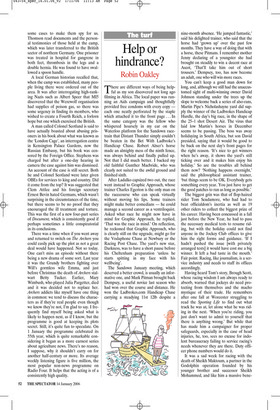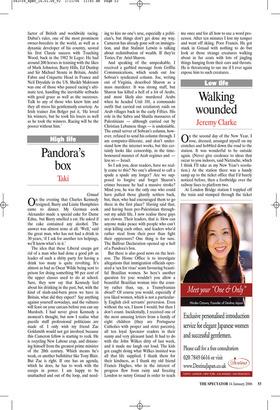The turf
Help or hindrance?
Robin Oakley
There are different ways of being helpful as my son discovered not long ago filming in Africa. The local paper was running an Aids campaign and thoughtfully provided free condoms with every copy each one neatly perforated by the staple which attached it to the front page ... In the same category was the fellow who whispered hoarsely in my ear on the Waterloo platform for the Sandown racetrain that Distant Thunder simply couldn’t be beaten in the Bet With Ladbroke’s Handicap Chase. Robert Alner’s horse made an almighty mess of the ninth fence, was always behind and finally pulled up. Not that I did much better. I backed my old faithful Gunther Macbride, who was clearly not suited to the awful ground and finished sixth.
After Ladalko capsized two out, the race went instead to Graphic Approach, whose trainer Charles Egerton is the only man on the racecourse who can speak virtually without moving his lips. Some trainers might make better comedians — he could manage a second career as a ventriloquist. Asked what race he might now have in mind for Graphic Approach, he replied, ‘That was the race in mind.’ On reflection, he reckoned that Graphic Approach, who is clearly still on the upgrade, might go for the Vodaphone Chase at Newbury or the Racing Post Chase. The yard’s new star, Darkness, was to have a short pause before his Cheltenham preparation ‘unless he starts spitting in my face with his wellbeing’.
The Sandown January meeting, which deserved a better crowd, is usually an informative one, and Mark Pitman brought back Dempsey, a useful novice last season who had won over the course and distance. He won the Ladbrokes.com Handicap Chase carrying a steadying 11st 12lb despite a nine-month absence. ‘He jumped fantastic,’ said his delighted trainer, who said that the horse had ‘grown up’ over the past few months. They have a way of doing that with a horse, these Pitmans. I remember mother Jenny declaring of a youngster she had brought on steadily to win a decent race at Ascot, ‘That’ll take him out of short trousers.’ Dempsey, too, has now become an adult, one who will win more races.
You can’t keep a good man down for long, and, although we still had the unaccustomed sight of multi-winning owner David Johnson standing under the trees up the slope to welcome back a series of also-rans, Martin Pipe’s Nicholashayne yard did supply the winner of the Ladbrokes Handicap Hurdle, the day’s big race, in the shape of the 25–1 shot Desert Air. The virus that laid low Martin’s horses in December seems to be passing. The boss was away holidaying in South Africa, but son David presided, saying that it would be good to be back on the next day’s front pages for the right reason. ‘It’s nice to get winners when he’s away, it shows the yard’s still ticking over and it makes him enjoy his holiday.’ So are the troubles all behind them now? ‘Nothing happens overnight,’ said the philosophical assistant trainer, ‘but things seem to be OK. Everybody gets something every year. You just have to get the good patches to run as long as possible.’ The biggest grin was that of flop-haired rider Tom Scudamore, who had had to beat officialdom’s inertia as well as 19 other riders to collect the biggest prize of his career. Having been concussed in a fall just before the New Year, he had to pass the necessary medical tests to resume riding, but with the holiday could not find anyone in the Jockey Club offices to give him the right forms and guidance. ‘If I hadn’t pushed the issue [with privately arranged tests] it would have cost me a big winner. It left a bad taste in the mouth.’ Fair point. Racing, like journalism, is a service industry and needs to staff its offices accordingly.
Having heard Tom’s story, Brough Scott, whose racing wisdom I am always ready to absorb, warned that jockeys do need protecting from themselves and the macho mystique of their trade. He remembers after one fall at Worcester struggling to read the Sporting Life to find out what track he was at, let alone what he was riding in the next. ‘When you’re riding, you just don’t want to admit to yourself that there is anything wrong.’ But while that has made him a campaigner for proper safeguards, especially in the case of head injuries, he, too, sees no excuse for indolent bureaucracy failing to service racing’s needs whenever they are there. Duty officer phone numbers would do it.
It was a sad week for racing with the death of Sheikh Maktoum, a partner in the Godolphin operation founded by his younger brother and successor Sheikh Mohammed, and like him a massive bene factor of British and worldwide racing. Dubai’s ruler, one of the most prominent owner-breeders in the world, as well as a dynamic developer of his country, scored his first Classic success with Touching Wood, back in the 1982 St Leger. He had around 200 horses in training with the likes of Mark Johnston, Barry Hills, Ed Dunlop and Sir Michael Stoute in Britain, André Fabre and Criquette Head in France and Neil Drysdale in the US. Sheikh Maktoum was one of those who passed racing’s ultimate test, handling the inevitable setbacks with good grace as well as the successes. Talk to any of those who knew him and they all stress his gentlemanly courtesy. As Irish trainer Jim Bolger put it, ‘He loved his winners, but he took his losers as well as he took the winners. Racing will be the poorer without him.’















































 Previous page
Previous page